Immigrants are reviving Paterson, N.J., from its difficult past
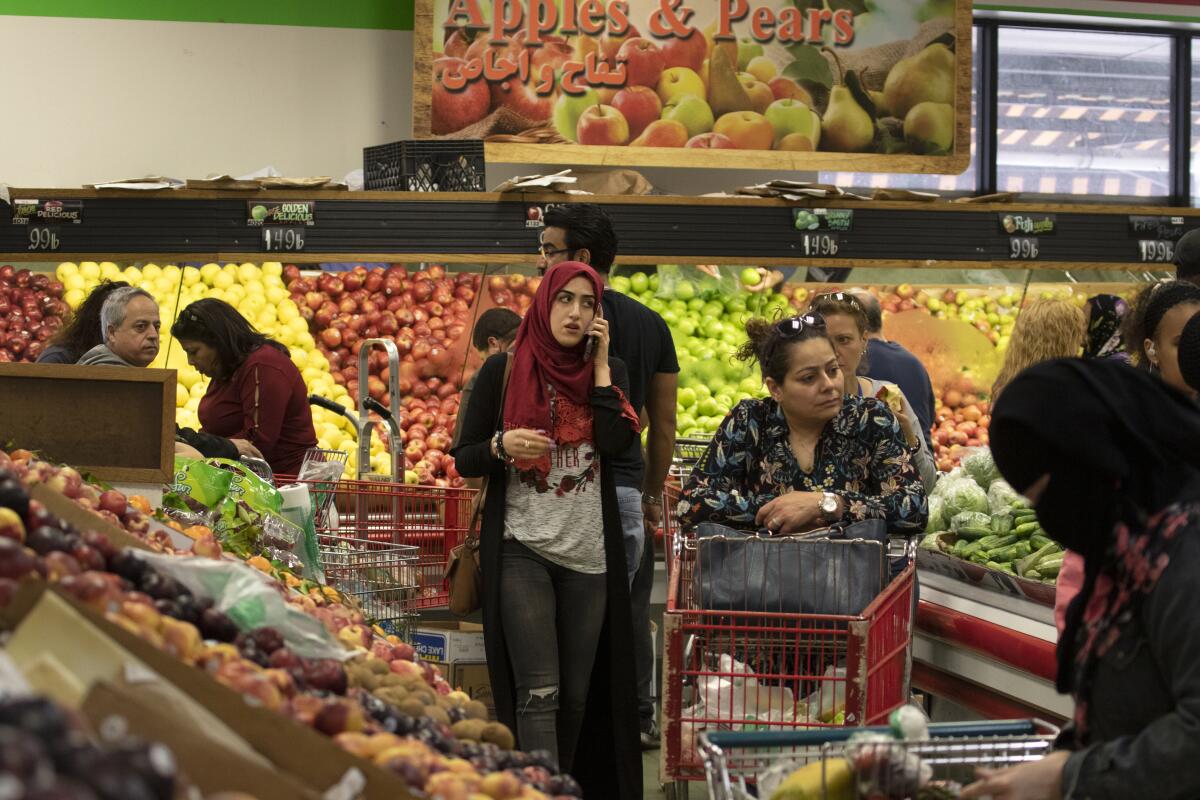
- Share via
PATERSON, N.J. — It was nearly 6,000 miles from the family and friends he left in Egypt a year ago to the park bench where Ismail Mohamed sat puffing on a cigarette, surveying a block lined with Middle Eastern restaurants. But it felt very much like home.
A mile of Main Street here in New Jersey’s third-largest city is so reminiscent of the Middle East that some residents refer to it as Little Ramallah, others as Little Istanbul. Within a stretch of 10 blocks, pushing into neighboring Clifton, you’ll find Arab barbers and doctors; halal butchers and Muslim legal services; advertisements for all-inclusive trips to hajj, the Muslim pilgrimage to Saudi Arabia; and modest fashion retailers.
South Paterson is among a handful of Middle Eastern enclaves in the U.S. with a similar vibe, among them Warren Avenue in Dearborn, Mich.; Little Arabia in Anaheim; Atlantic Avenue and Bay Ridge in Brooklyn, N.Y.
Looking back, Mohammad Abdalla can see things clearly: He was out of place -- a Muslim Palestinian American operating a Mexican American market in Orange.
Some Americans might want immigrants in general, and those from the Middle East in particular, to go home. But here, they’ve created a sense of optimism, helping renew a city beleaguered by crime and corruption, and long in decline. Paterson narrowly averted insolvency only three years ago.
You wouldn’t know that by walking around south Paterson. Main Street is buzzing, and many of its buildings are new. As more immigrants trickle in, family businesses are leading a mini-boom. Andre Sayegh, Paterson’s gregarious Arab American mayor, sees a future for south Paterson as a national culinary destination. He refers to south Paterson as the “halal meat-packing district” and to himself as the city’s Anthony Bourdain.
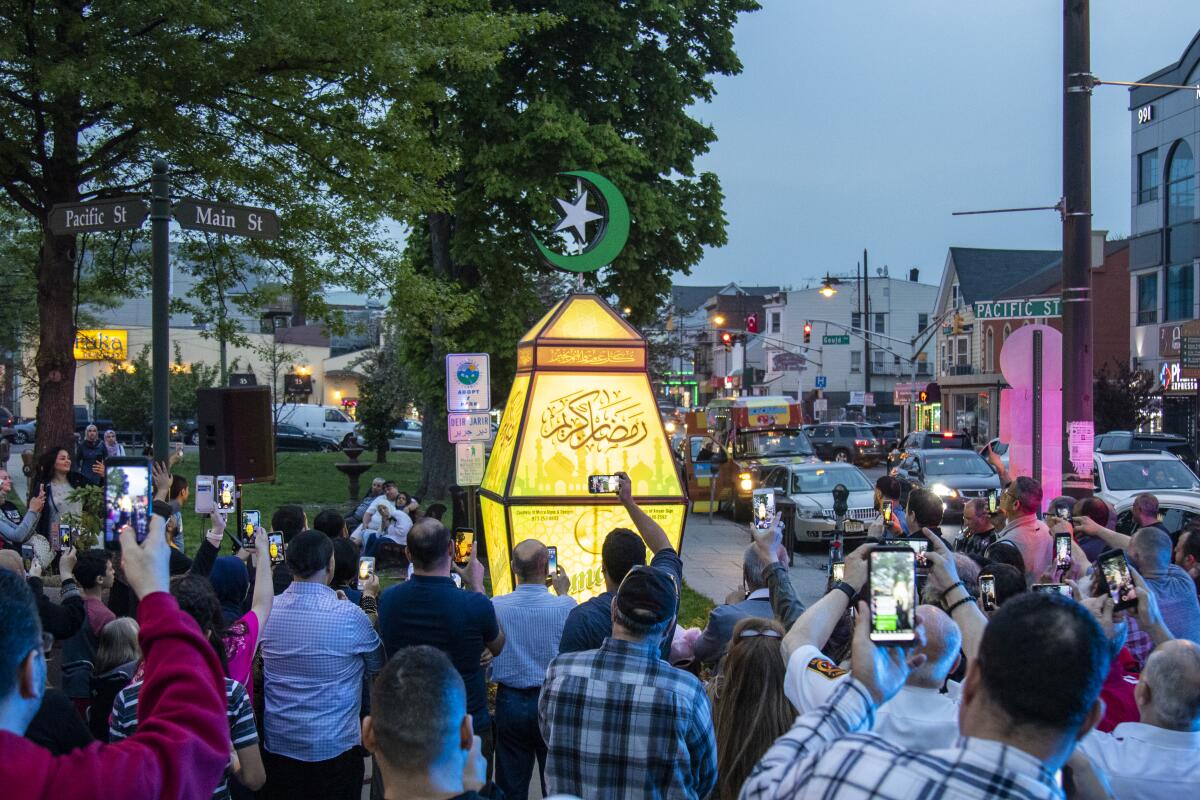
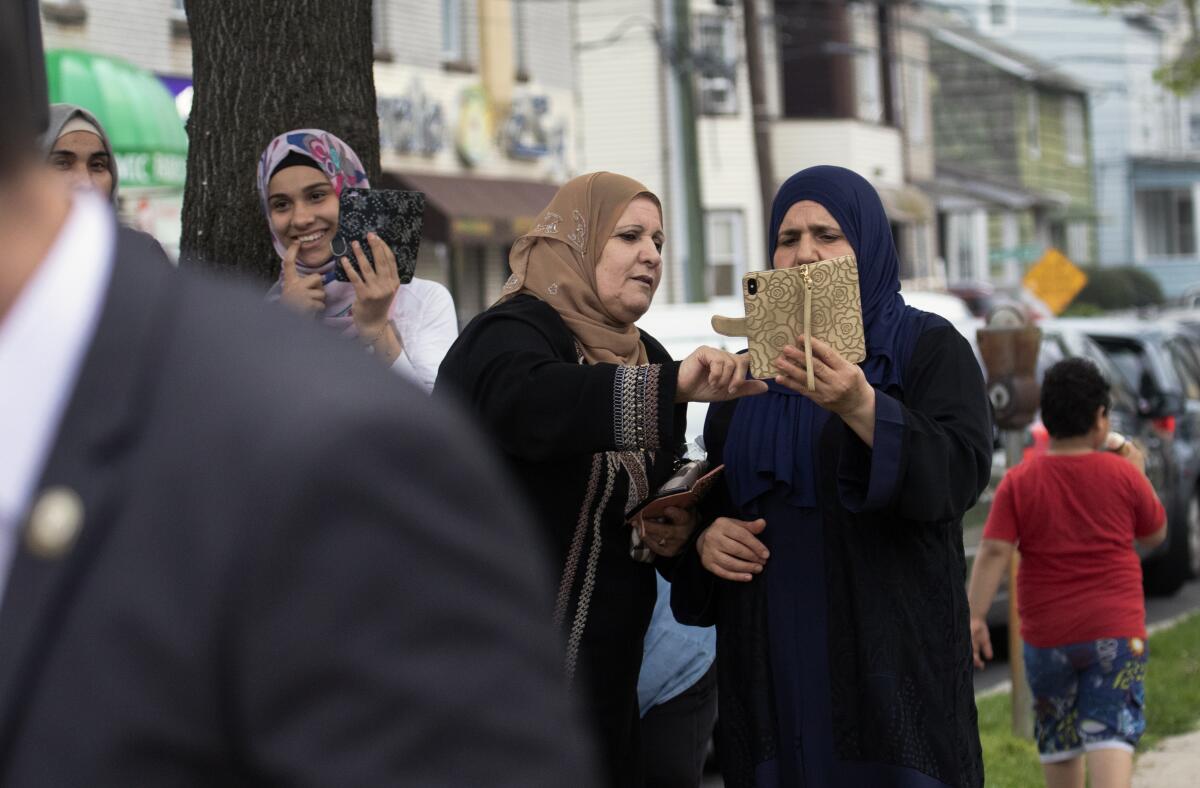
Crime rates are lower than in the rest of Paterson and violent crimes are rare. Sayegh recently swore in the Police Department’s first Palestinian officer, Serein Tamimi, who is also the first to wear a hijab. In June, John Abdelhadi was sworn in as Paterson’s chief judge, making him the first Palestinian American in the U.S. to serve in an equivalent position, Sayegh said.
Soon after Mohamed, who was a law student in Egypt, arrived in the United States, friends told him south Paterson was a “safe place” for newly arrived Arabs. Signs around town are displayed in Arabic, often without English translations. Paterson’s Arab American Civic Assn. runs a free Arabic language program on Saturdays; halal food is served at some schools.
Over the years, many Syrians, Palestinians, Jordanians and Lebanese here have melded their Levantine accents into a generic one and passed it along to their children.
“The only thing that’s distinctly American here is the infrastructure,” Mohamed said. “Otherwise, it’s almost identical to the Arab world.”
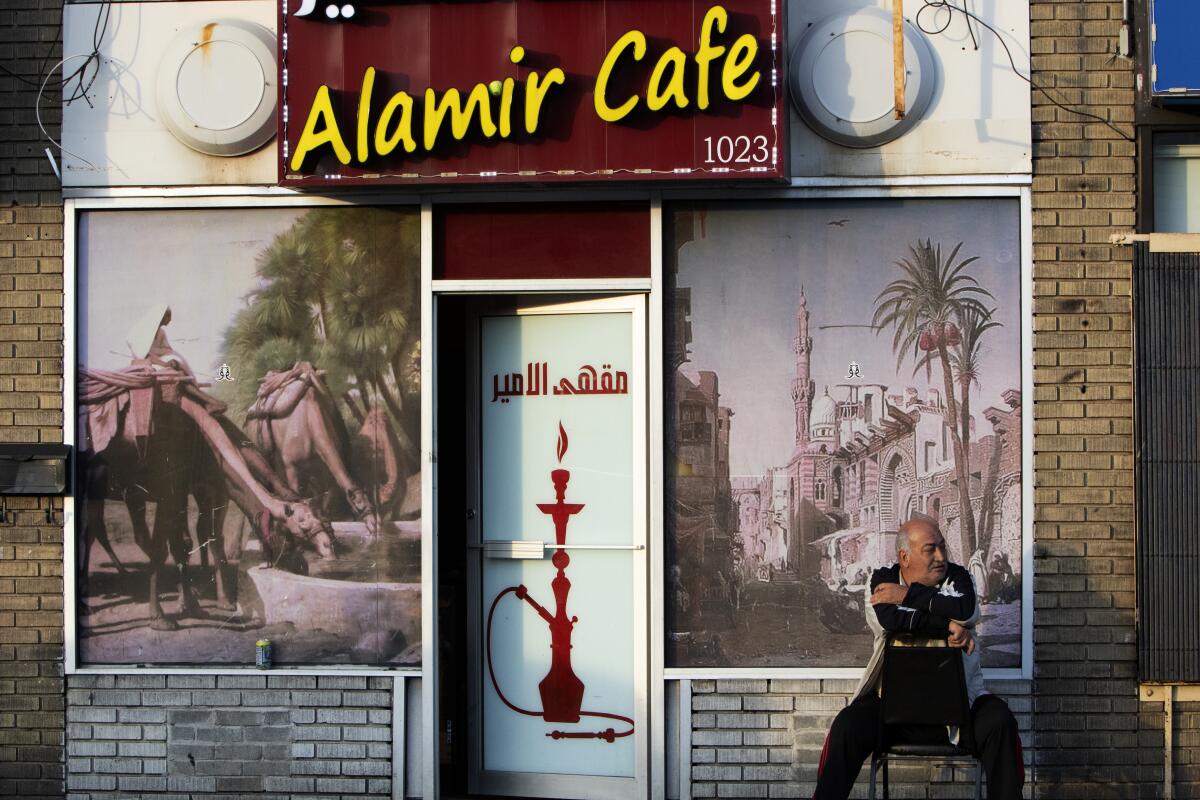
He quickly corrected himself, adding a sentiment echoing generations of immigrants to the U.S.: “Actually, here, with any goal, with any dream, I feel I have a chance, and that I can pursue my ambitions.”
Census data don’t reveal how many people of Middle Eastern or North African descent live in the area, but the Palestinian American Community Center in Clifton estimates there are roughly 15,000 Arabs in Paterson, a city of more than 145,000.
Arabs, and in particular Syrians, have a long history in the city founded in 1792 by Alexander Hamilton, who seized on the manufacturing potential of the Passaic River’s Great Falls. Silk manufacturing was decimated by blight and locusts in what is now Lebanon in the late 19th century, but moved to Paterson and West Hoboken, where it was resurrected by Syrian American factories, according to Gregory Orfalea, author of “The Arab Americans: A History.” By 1924, there were 25 such factories in the city.
Orfalea said the vast majority of Arab Americans were as outraged as other Americans when Al Qaeda militants attacked the World Trade Center on Sept. 11, 2001. But in the aftermath, Paterson’s Omar Mosque was targeted for surveillance by the New York Police Department. President Trump claimed during his presidential campaign that “thousands and thousands” of Muslims in Jersey City had celebrated the terrorist attacks; the charge would later incorporate Paterson.
Although the claim has been widely debunked, Orfalea said fear stirred up by Trump, social media and sensationalized political discourse make some Americans even more fearful today of Arab immigrants. Paterson’s unique vibe of “holding on to home may be larger today due to the fear,” Orfalea said.
Sayegh, whose parents immigrated from Lebanon and Syria, is committed to countering that fear. A devout Catholic married to a Muslim woman, he is presenting south Paterson as an immigrant success story and an investment opportunity.
Palestine Eats, a multimillion-dollar enterprise led by Abed Awad, a Palestinian lawyer and businessman, and backed by the mayor, will feature a catering operation, street-level stands and a cafe housing Palestinian artifacts when it opens next year. A public-private partnership, it is to serve as an anchor for a broader incubator program. “We’re proud of our multiculturalism in Paterson; we’re trying to monetize it,” Sayegh said.
Some of south Paterson’s earliest family establishments set up shop in the 1950s and 1960s. Fattal and Noury, entrepreneurial families from Aleppo, Syria, are household names. Over the decades, they have been joined by dozens of others.
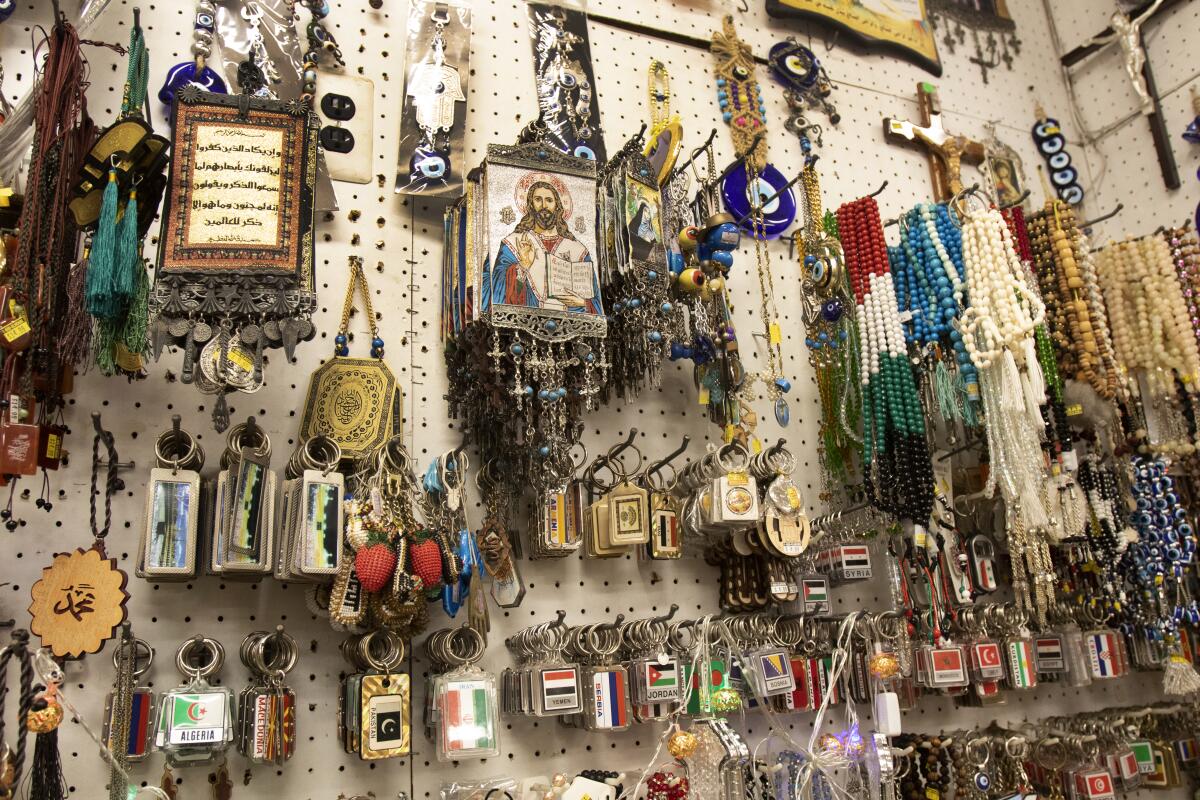
Fattal’s, founded in 1968, has evolved into a hypermarket where you can find 24-carat gold jewelry imported from the Middle East, and Arab food products including za’atar, rose water, halloumi cheese, fava beans and even Nestle’s Nido, a tinned powdered milk popular in Levantine countries. At the back is a halal butcher and at the corner a bakery with a large stone oven as its centerpiece.
Mohammed Al-Awdeh, a Yemeni American bodega owner from New York, was at Fattal’s on his monthly trip with his wife and daughter, stocking up on Laziza non-alcoholic beer and halal meat. But they also come to south Paterson because the doctors are Muslims and because the restaurant prices are reasonable. “Here in south Paterson, I’m among friends,” he said.
The Nouri Bros. business started in 1978 with a modest, traditional bakery. Now, the family’s shopping center comprises multiple storefronts selling items including spice blends, Egyptian DVDs, religious souvenirs and kitchenware, as well as offering wedding and engagement services.
In April, the family, which also has Armenian and Christian roots, opened a restaurant in a refurbished space specializing in Syrian and Lebanese cuisine.
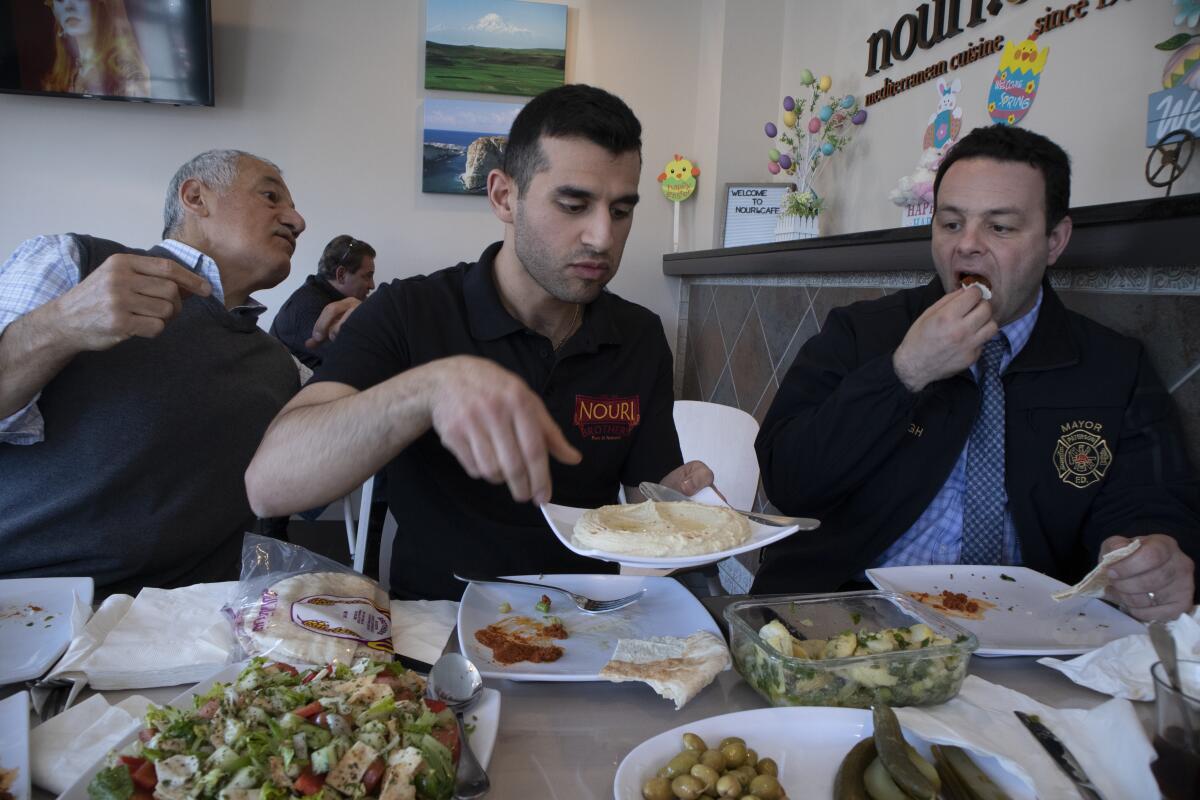
Just steps from Nouri Bros., Palestinian Americans Nouridin Darwish and his mother, Fatima, were enjoying the halal grilled meat at Toros, a Turkish restaurant. “If you want to get the flavor that you’re used to, that’s Middle Eastern, you come here: It’s convenient, it’s close to New York, it’s delicious,” said Darwish, who had traveled from Buffalo.
Sayegh became Paterson’s mayor last year, and his optimism is impressive, considering that two of his recent predecessors were jailed for corruption.
The mayor shifts between broken Arabic and New Jersey-inflected English, interrupting his lunch of manakish and mezze at Nouri to greet diners by their first names as they enter. Ever the patriot, he bids them farewell with “God bless you — and America.”
Sayegh has a food blog that he runs from his Facebook page, giving followers “highly recommended restaurant items of the week” in video snippets filmed by his wife. He’s helped organize a food truck festival and regularly posts about new eateries on his Instagram account.
“I’m trying to create a city of gastronomy: We want to leverage the culinary culture that exists here and become even more of a destination for foodies,” he said.
South Paterson’s low crime rate is directly connected with the business acumen of its restaurant owners and grocers, said Jerry Speziale, the police commissioner.
“For as long as I’ve been in law enforcement in this area, it’s always been a group that’s been very willing to work with us,” he said. “They care about the businesses in the area and have always worked hard to make sure the area thrives.”
Sayegh works with America Indivisible, a nonprofit organization that seeks to address rising bigotry against Muslims.
“We want to show how the Muslim community in America is thriving, to show they are productive citizens,” he said. “If Donald Trump wants to see what Arabs and Muslims are doing in America, let him come to south Paterson, and he can see for himself.”
Hankir wrote this article for the Round Earth Media program of the International Women’s Media Foundation.
More to Read
Sign up for Essential California
The most important California stories and recommendations in your inbox every morning.
You may occasionally receive promotional content from the Los Angeles Times.


![LOS ANGELES, CA - JUNE 17: [Cody Ma and Misha Sesar share a few dishes from their Persian Restaurant Azizam] on Monday, June 17, 2024 in Los Angeles, CA. (Ethan Benavidez / For The Times)](https://ca-times.brightspotcdn.com/dims4/default/7ffc7f6/2147483647/strip/true/crop/5110x3417+306+0/resize/320x214!/quality/75/?url=https%3A%2F%2Fcalifornia-times-brightspot.s3.amazonaws.com%2F79%2Fdc%2F4d29255545f5b9813315901692bc%2F1459972-fo-azizam-review20-eba.JPG)










